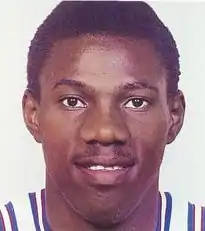Derek Smith (basketball)
Derek Ervin Smith (November 1, 1961 – August 9, 1996) was an American professional basketball player. He won a national championship with the Louisville Cardinals in 1980, and spent nine years in the National Basketball Association (NBA) in a career shortened by a knee injury. He would later become an assistant coach for the Washington Bullets from 1994 until his death.
 Smith, circa 1986 | |
| Personal information | |
|---|---|
| Born | November 1, 1961 Hogansville, Georgia |
| Died | August 10, 1996 (aged 34) On board MS Norwegian Dream |
| Nationality | American |
| Listed height | 6 ft 6 in (1.98 m) |
| Listed weight | 205 lb (93 kg) |
| Career information | |
| High school | Hogansville (Hogansville, Georgia) |
| College | Louisville (1978–1982) |
| NBA draft | 1982 / Round: 2 / Pick: 35th overall |
| Selected by the Golden State Warriors | |
| Playing career | 1982–1991 |
| Position | Shooting guard / Small forward |
| Number | 41, 18, 21, 43 |
| Coaching career | 1994–1996 |
| Career history | |
| As player: | |
| 1982–1983 | Golden State Warriors |
| 1983–1986 | San Diego / Los Angeles Clippers |
| 1986–1989 | Sacramento Kings |
| 1989–1990 | Philadelphia 76ers |
| 1990–1991 | Boston Celtics |
| As coach: | |
| 1994–1996 | Washington Bullets (assistant) |
| Career highlights and awards | |
| |
| Career NBA statistics | |
| Points | 5,232 (12.8 ppg) |
| Rebounds | 1,300 (3.2 rpg) |
| Assists | 866 (2.1 apg) |
| Stats at Basketball-Reference.com | |
Career
Smith attended the University of Louisville from 1979 to 1982. He was a member of the 1980 University of Louisville Cardinals basketball team which won the NCAA championship, defeating UCLA 59–54.
Smith is sometimes credited with popularizing the term "high five" during the 1979–80 basketball season.[1]
Smith was selected 35th overall, 13th in the second round, by the Golden State Warriors in the 1982 NBA draft. He played for the Los Angeles Clippers from 1983 to 1986. He averaged 22 points per game in 1984–85. In the next season, he averaged 23.5 points per game, but he was limited to 11 games[2] because of a knee injury followed by mononucleosis.[3] He played for the Sacramento Kings from 1986 to 1989, for the Philadelphia 76ers in 1989 and 1990, and for the Boston Celtics in 1991. During his NBA career, he scored over 5,000 points.
Smith became an assistant coach for the Washington Bullets in 1994.
Death
In August 1996, Smith went on a cruise on the Norwegian Cruise Line ship MS Dreamward for season ticketholders of the Bullets and the Washington Capitals. He took his family along. Smith and then-Bullets player Tim Legler volunteered to hold basketball clinics during the cruise.
On August 9, 1996, while the ship was near Bermuda and returning to New York City, Derek Smith suddenly suffered an apparent massive heart attack during a farewell cocktail party in the presence of members of his team. Ship medics attempted to resuscitate him for 25 minutes before declaring him dead.
Smith was buried at Cave Hill Cemetery in Louisville, Kentucky. His funeral was attended by the Bullets team and several former teammates.[4][5]
Family
Derek was married to Monica (who has since remarried), with whom he had two children: a daughter, Sydney, and a son, Nolan. Nolan played college basketball for the Duke Blue Devils and was drafted by the Portland Trail Blazers. In 2010, like his father 30 years before him, Nolan made it to the NCAA D-I tournament; Nolan and his Duke Blue Devils won the National Championship, just as Derek and his Louisville Cardinals had done in 1980. Nolan has a tattoo of his father on his right arm.
References
- Jack Welch (December 2000). "50 Things Every Louisvillian Should Know". Louisville Magazine. Archived from the original on 2011-07-13. Retrieved 2009-12-16.
- Derek Smith. basketball-reference.
- Sam McManis. "Mononucleosis Stops Derek Smith; Clippers Win". Los Angeles Times. March 13, 1986. Sports, 3.
- Mitch Lawrence (September 1, 1996). "Death of a Driven Man – Derek Smith's Mysterious Passing Claims True Competitor". New York Daily News. Retrieved April 3, 2010.
- "Outside the Lines – Smith Following In Father's Footsteps". ESPN. March 31, 2010. Archived from the original on April 3, 2010. Retrieved April 3, 2010.